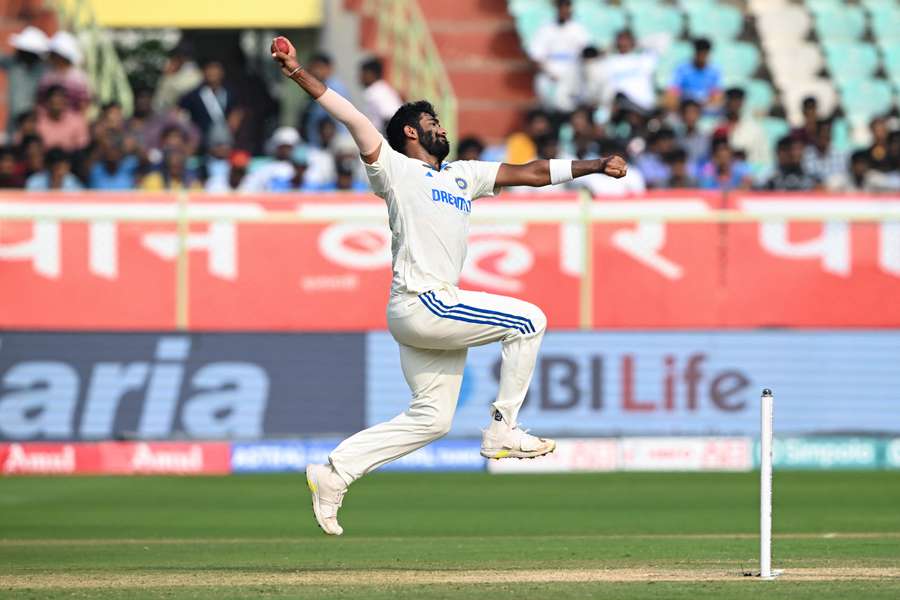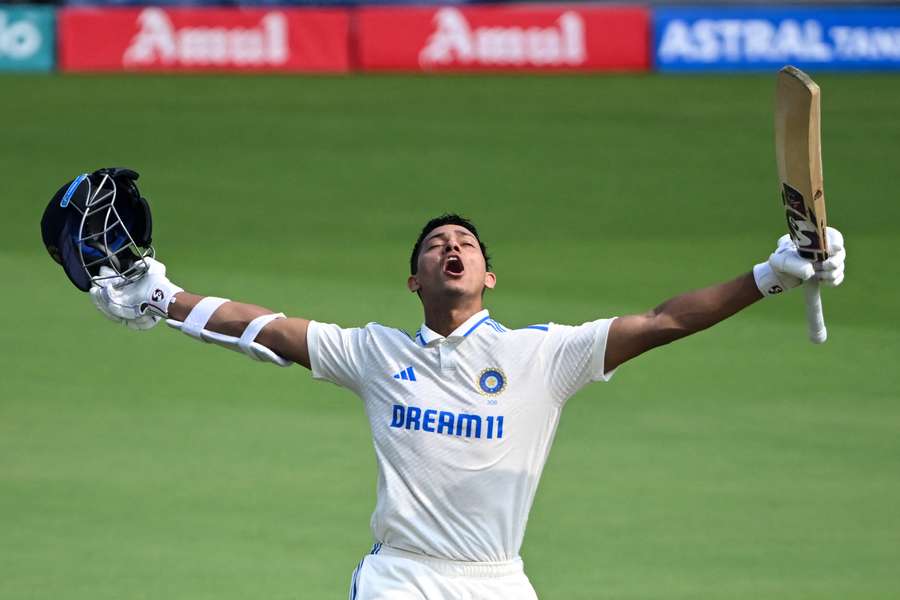Cricket Corner: Bumrah goes bang as Jaiswal and Ravindra make statement scores

In a nod to the longest form of the game - Test cricket - the article is broken into three sections to mirror the main intervals in a day’s play: Lunch - the main course; Tea - something extra; and Stumps (the end of play) - something to ponder over a few drinks at the bar.
Lunch: Is Bumrah already one of the greats?
India’s win in the second Test in Visakhapatnam (a.k.a. Vizag) was marked by three standout performers. With the bat, Yashasvi Jaiswal set the match up with a double ton in the first innings (more on him below) and Shubham Gill got back amongst the runs with a century in India’s second innings to help set England a practically unreachable target. However, while they were both vital, the player of the match was bowler Jasprit Bumrah, whose 6-45 in the first innings decimated England’s middle order after a good start. He helped clean things up at the end, too, with 3-46 as India won by 106 runs.
Bumrah’s yorker to blow Ollie Pope's stumps to pieces was one of those deliveries that showcased just why he is one of the most feared bowlers in the world. It was fast, it was accurate and it was swinging. Already 30, his 34 Tests feel a little light but he passed the 150-wicket mark in the match - a significant milestone and a good point at which to observe his career to date.
In a word, Bumrah’s international record is outstanding. His 155 Test wickets have come at an average of 20.19. In the history of Test cricket, there are less than 25 players who have bowled a minimum of 2000 balls at an average lower than 21. Most of those are from the late 19th and early 20th century and only three are currently active - Bumrah, his teammate Axar Patel and New Zealand’s Kyle Jamieson. Both of the latter two still have less than 100 wickets and if we consider only players who have taken 150 or more, Bumrah has the second-best average of all-time behind Sydney Barnes.
At the rate he’s going, Bumrah will end up in the pantheon of great modern quicks alongside Glenn McGrath and Curtly Ambrose. What really sets him apart from his contemporaries is his consistency across formats. In one-day internationals (ODI), he has 149 wickets at 23.55. In Twenty20 (T20) internationals, he has 74 at 19.66 and an economy rate of 6.55. We’ve gotten used to looking at India’s bowling stocks and envying their spinning depth, they now have the best pace bowler in the world to go with that. What’s more, Bumrah’s developing a happy knack for clean bowling Ben Stokes, something the England captain seems to handle less and less graciously. The third Test in Rajkot begins on the 15th.
Tea: Double double centurions
As mentioned above, one of the standout performances in the Vizag Test was Jaiswal’s imperious double ton in the first innings. His 209 came at a healthy strike rate of 72 and, after just six Test matches, it was the 22-year-old’s second massive total. He scored 171 against the West Indies last year in his very first innings in Test cricket. Incredibly, when he came into India’s red-ball side, Jaiswal had a first-class average above 80, albeit in less than two dozen matches. Beyond that, he’s made an impact in the IPL, too, already notching a ton in the world’s premier T20 tournament for Rajasthan Royals. But numbers are not all that’s impressive about Jaiswal.
At the age of 10, he migrated to Mumbai from his native state of Uttar Pradesh in the north to pursue his dreams of playing cricket. He went from living and working in a dairy shop as a child to taking shelter in tents for three years next to the sprawling cricket fields of Azam Maidan before he was spotted, taken in and nurtured by the head of a local academy. Jaiswal gained prominence at the under-19 World Cup in 2020, where he led the scoring charts with 400 runs for India. Since then, it’s been a steep trajectory to the top of the game for a batter that could go on to be one of the world’s very best in years to come.

The other double centurion doing the rounds is Kiwi Rachin Ravindra. You might remember Ravindra as one of the breakout stars of the World Cup last year, where he scored three centuries. After that, he surprisingly wasn’t used in New Zealand’s two-Test tour of Bangladesh but he has since made his way back into the red-ball side for the ongoing series against South Africa. Previously, Ravindra had played three Tests and in all of them, he was used as an allrounder - batting seven and contributing with his more than handy left-arm spin. Since his exploits at the World Cup, however, he’s rightly been seen as a batter who bowls a bit. He came into the side for the first Test at Mount Maunganui at the expense of Henry Nicholls at number four.
In the first innings, Ravindra amassed 240 runs as the Kiwis posted an imposing 511 before bowling the Proteas out for just 162. The hosts went on to steamroll their guests, winning by 281 runs. It should be noted, there is a huge asterisk next to this series with South Africa’s best players not involved but still, a double century is a double century! Although two years Jaiswal’s senior, Ravindra is still very young given the impact he has already had. Considering New Zealand’s greatest-ever batter Kane Williamson is now 33 and entering the autumn of his career, Ravindra could not be coming of age at a better time for the Black Caps. He has enough time to develop before Williamson retires and seems destined to then take the baton (or should I say bat?) as New Zealand’s key player.
Stumps: Bartlett goes (Jake Fraser-)Berserk
We mentioned last week that Australia would face the West Indies in three ODIs and three T20s and before you can say ‘back-to-back white ball series’ the 50-over matches have come and gone already. And a little quicker than expected with the third match lasting just a touch over 30 overs, such was the thrashing the hosts handed out to a Windies side that was significantly changed from their incredible second-Test win. Australia won the series 3-0.
The Aussies took the opportunity presented by the low-key and largely irrelevant 50-over series (given we are in a T20 World Cup year) to blood some of their up-and-comers. None stole the show quite like right-arm swing bowler Xavier Bartlett, who played the first and third ODIs taking four wickets in each. His 4-17 in the opener were the second-best figures for an Australian on debut in an ODI and he followed that up a few days later with 4-21. Not a bad start to international cricket at all.
Also making their debuts for Australia in the series were express quick Lance Morris, who picked up two wickets in the third match before suffering an injury, allrounder Will Sutherland, whose sister Annabel is also an international cricketer, and explosive top-order batter Jake Fraser-McGurk, who appeared at the same U19 World Cup as Jaiswal.
At 21, Fraser-McGurk was the youngest of the debutants. It’s not often that players are elevated to the national side in any format so young in Australia, such is the depth in the domestic scene. If they are, they are usually especially gifted. A hard-hitting, freewheeling batter, Fraser-McGurk broke the world record for the fastest century in a List A match (off just 29 balls) last year. He showcased his serious willow-wielding talents in the final match of this series as he smacked 41 off 18 as Australia raced to their tiny target of 87 in Canberra.
Speaking of the next generation, what about the next-next generation? We’ve been touching on U19 World Cups above and, funnily enough, there is one going on in South Africa right now with the final this Sunday! India, who edged the hosts in the first semi-final, will play the winner of Australia and Pakistan, who meet on Thursday. All this talk of talent has got me thinking… Who will the next Jaiswal, Ravindra, Bartlett or Fraser-McGurk be? Whoever it is, the future is bright in the world of cricket, that's for sure.

